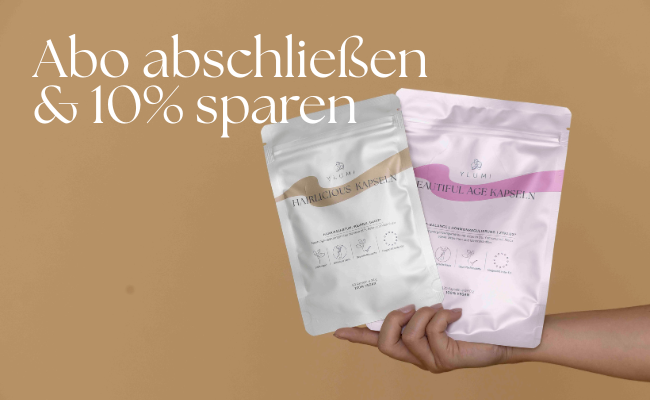
THE GUT-BRAIN AXIS: HOW A HEALTHY GUT AFFECTS YOUR MOOD
As a health-conscious person, you've probably read or heard by now that our gut influences our overall well-being, especially our physical health. But did you know that our gut health is also closely linked to our psyche? Depression and bad moods can have their origins in an imbalanced gut. That's why today we're talking about the gut-brain axis and how a healthy gut affects our mood.
WHAT IS THE GUT-BRAIN AXIS?
First of all, it's important to clarify what the gut-brain axis actually is. Phrases like "Follow your gut" or "That upsets my stomach" are by no means unfounded. As numerous researchers worldwide have discovered, our gut flora influences what we think and feel. Scientists at the University of North Carolina, for example, have proven that the condition of the gut flora and the composition and accumulation of bacteria can be linked to mood. [1]
THE ROLE OF THE INTESTINAL FLORA
Our intestinal flora, or rather the metabolic products produced by these bacteria, plays a central role in the exchange of information between the gut and the brain. Amino acids (e.g., L-tryptophan, which is needed for the production of serotonin) as well as short-chain fatty acids are produced there. These have a major influence on our emotions, concentration, and stress resistance.
THE VAGUS NERVE
As already described, the gut and brain communicate with each other via the gut-brain axis. In addition to nerve connections in the spinal cord, this communication also occurs via a nerve that runs from the brainstem to the gut and is involved in many regulatory processes: the vagus nerve. It is the largest nerve of the parasympathetic nervous system and regulates not only the gut but also virtually all other organs.
OTHER COMMUNICATION CHANNELS
In addition, the gut and brain also communicate with each other through the enteric nervous system. This network of nerves within the intestinal wall contains approximately 100 million nerve cells, four to five times as many as the spinal cord.
Communication between the gut and brain also occurs through hormones and neurotransmitters. Over 20 hormones are produced by gut bacteria, including serotonin (more on this in the next section).

HOW DOES THE GUT INFLUENCE OUR MOOD?
As described in the previous section, the gut has a significant influence on our brain (and vice versa). This, in turn, means that our gut health is reflected in our mental health and mood. This is because a large portion of the feel-good hormone serotonin is produced in the gut.
But serotonin isn't just responsible for feelings of happiness and good mood. It also forms the precursor to the sleep hormone melatonin, thus influencing our circadian rhythm. So it's no wonder we feel so good when our digestive tract is healthy.
INTESTINAL HEALTH AND MENTAL DISEASES
Several scientific studies now show that the intestinal flora of healthy people differs significantly from that of people with mental illnesses. The latter have a significantly lower proportion of beneficial intestinal bacteria.
Taking probiotics can help positively influence the bacterial colonization of the gut. This ensures that good bacteria multiply and can better perform their functions (such as the production of the amino acid L-tryptophan, which has a significant influence on the formation of serotonin). There are now specially developed probiotics that specifically target the gut-brain axis.
YLUMI BELLY BEAUTY FOR MORE GOOD VIBES
Our Belly Beauty Capsules contain high-quality herbs and medicinal mushrooms such as organic Hericium Erinaceus, organic Triphala, and organic Brahmi, as well as 15 clinically tested viable lactic acid bacteria, each containing 5 billion CFU (10 billion colony-forming units per daily dose). They provide the perfect daily dose of probiotic bacteria to support digestion and intestinal flora.

HOW DOES STRESS AFFECT THE GUT?
However, communication between the gut and brain doesn't just work from the bottom up, but also the other way around. When we're stressed, the brain releases neurotransmitters and stress hormones that heighten our entire body's alertness. If we're exposed to severe stress for a long time, this can lead to the breakdown of the connections between the intestinal cells, resulting in a leaky gut. This so-called leaky gut syndrome leads to increased permeability of toxins and pathogens, which can lodge in the intestinal wall and disrupt the intestinal flora.
YLUMI AGAINST STRESS
Taking various natural superherbs can help prevent everyday and work-related stress. Our BEAUTY X HYALURONIC CAPSULES and COCO BEAUTY SPARKLE contain adaptogenic herbs that increase stress resistance and promote inner balance. The 100% pure vitamin C in ourORGANIC IMMUNE CAPSULES also has a positive effect on your nerves.
And pssst: Next week we're launching our brand-new product that will empower you and your well-being from within in a whole new way. We're so excited and can't wait to tell you more about it soon. You'll find out all the details in our newsletter and on social media.
[1] Lyte, M. (2013) Plos I Pathogens. Microbial Endocrinology in the Microbiome-Gut-Brain Axis: How Bacterial Production and Utilization of Neurochemicals Influence Behavior. Vol. 9. Issue 11: e1003726 [http://journals.plos.org/plospathogens/article?id=10.1371/journal.ppat.1003726]




